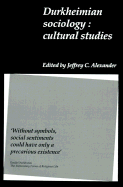Book contents
- Frontmatter
- Contents
- List of contributors
- Acknowledgements
- Introduction: Durkheimian sociology and cultural studies today
- Social change and sacralization
- Micro and macro in symbolic context
- Ritualization and public life
- 7 Articulating consensus: the ritual and rhetoric of media events
- 8 Culture and political crisis: “Watergate” and Durkheimian sociology
- Index
7 - Articulating consensus: the ritual and rhetoric of media events
Published online by Cambridge University Press: 05 July 2011
- Frontmatter
- Contents
- List of contributors
- Acknowledgements
- Introduction: Durkheimian sociology and cultural studies today
- Social change and sacralization
- Micro and macro in symbolic context
- Ritualization and public life
- 7 Articulating consensus: the ritual and rhetoric of media events
- 8 Culture and political crisis: “Watergate” and Durkheimian sociology
- Index
Summary
Festive television
Televised events are advertised to the public as grandiose and unique. But, despite their individual qualities, many of these events seem to echo each other, to answer one another. They belong to a common genre. They share common rhetoric. Thus the coronation of Elizabeth II not only predates other “royal” events such as the wedding of Prince Charles and Lady Diana, or the funeral of Lord Mountbatten, it also displays a profound kinship with events apparently far removed both thematically and geographically, such as the visit of Anwar al-Sadat to Jerusalem, the first Moon landing, the Polish pilgrimage of Pope John Paul II. All these events share a consistent set of characteristics – semantic, syntactic, and pragmatic. Their kinship is perceived not only by sociologists but by those in the industry as well. Television organizations, for example, circulate from event to event updated lists of practical recommendations, technical handbooks, catalogues of dangers and mistakes. Viewers, too, experience their festive character; they invoke a sense of occasion.
Televised ceremonies
Semantically, these events are presented as celebrations of consensus, proclaiming in effect the charter of what is now called “civil religion.” Durkheim would agree. “What essential difference is there” asks Durkheim, “between an assembly of Christians celebrating the principal dates of the life of Christ, or of Jews remembering the exodus from Egypt or the promulgation of the decalogue, and a reunion of citizens commemorating the promulgation of a new moral or legal system or some great event in the national life?”
- Type
- Chapter
- Information
- Durkheimian SociologyCultural Studies, pp. 161 - 186Publisher: Cambridge University PressPrint publication year: 1988
- 21
- Cited by

